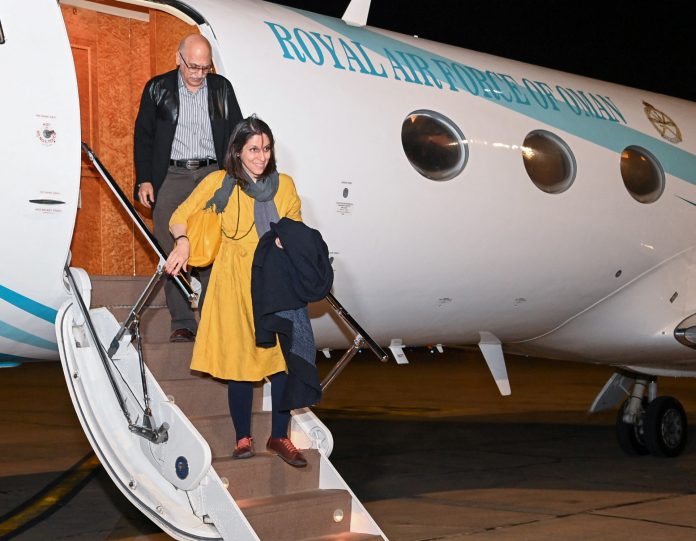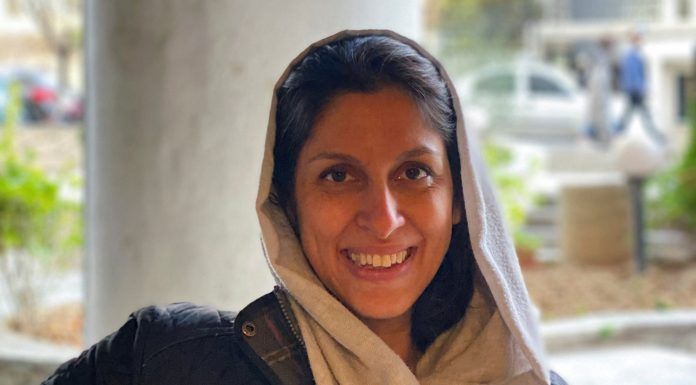
By Emma Batha
LONDON, March 16 (Thomson Reuters Foundation) – British-Iranian charity worker Nazanin Zaghari-Ratcliffe headed home from six years of captivity in Tehran on Wednesday, her surprise release sparking joy that she would finally join her London family.
Zaghari-Ratcliffe, 43, a project manager at the Thomson Reuters Foundation, was arrested in Tehran in April 2016 after taking her then one-year-old daughter Gabriella to visit her parents for the Iranian New Year.
She was convicted of plotting to overthrow the clerical establishment and sentenced to five years. In April 2021, she was sentenced to a further year in prison on a new propaganda charge, but had not yet started serving the term.
Zaghari-Ratcliffe denied all the charges against her and the case was widely seen as political.
As the charity worker flew to Britain, via a stopoff in Oman, her boss – Thomson Reuters Foundation CEO Antonio Zappulla – shared his thoughts on her release.
What’s your reaction to the news?
I’m extremely happy and excited. I saw the pictures of Nazanin boarding the plane and I got goosebumps.
It’s finally happening. It’s true. Nazanin is coming home and we’re over the moon. It’s been six long and dark years since she was effectively taken hostage. It’s been a very difficult time.
Nazanin’s treatment has been utterly inhumane, her family has experienced tremendous suffering. Nazanin has been the innocent victim of an international dispute, one that lasted way too long.
How has this affected her?
It’s been a living nightmare for her. She’s gone through every possible ordeal – separation from her daughter, solitary confinement, hunger strikes, dealing with illnesses.
She was released briefly and then returned to jail. Then, released under house arrest but with an ankle tag, then charged again.
On top of that, her daughter who used to visit her in jail went back to Britain to live with her dad and to attend school here in the UK, so she has been separated from Gabriella twice.
She has been through a rollercoaster of emotions.
When did you last talk to her?
We had a brief WhatsApp chat on Tuesday when she was handed back her passport. I could feel her excitement, but she was cautious after having had her hopes raised before.
We’ve had many conversations in the past. Several times throughout these years, before Christmas and the Iranian New Year, Nowruz, we would always have high hopes of her release.
These hopes have been constantly shattered.
We were clearly excited yesterday, but it was cautious optimism on both sides.
How would you describe Nazanin?
I knew her as a very dedicated and bubbly colleague, but I didn’t know just how resilient she is. I have nothing but admiration.
Nazanin’s life was upended, but her spirit was never broken. She is a truly remarkable woman, with a truly remarkable family.
Her voice over the phone was never the voice of someone you would imagine having endured all these experiences. That in itself was pretty surprising to me.
How have you been supporting her?
I’ve been speaking to her regularly since she was released under house arrest two years ago.
We had long conversations over the phone at weekends and would talk about many things – not only her situation, but also politics, philosophy, religion, the books that she were reading.
She’s an avid reader so she’s been reading a lot throughout these years. We weren’t just talking about the horror of her experience.
I often sent texts just saying ‘thinking of you’, ‘sending you hugs’, ‘we’re sending our love’, and there would be a brief exchange. Sometimes she would send a heart emoji, sometimes she would stay silent for a day.
The line of communication was always open but I was always very respectful of her emotions.
I have a duty of care towards her, so at times, respectful silence was the best form of communication, especially when news was bad and I knew she would be having a highly emotional day.
Does she realise how famous she is?
She laughed when I told her she was a big deal in Britain and that everyone knew her name. I don’t think she has quite understood how much the British public has followed her case.
Everyone in the country knows her name. She will soon experience that, and I am concerned about the impact that this might have on her.
Nazanin is a former hostage who has experienced immense trauma, it will be important for the general public to appreciate that.
Her story has touched the hearts of a lot of people here, and that’s also because of the campaigning her husband Richard has done.
He’s a remarkable man. He’s not only been a full-time dad since Gabriella was repatriated, but also a full-time campaigner who has kept Nazanin’s case in the media in a very sensitive manner. I have huge respect for him.
What about the future?
We will be providing all the support we can. Nazanin has continued to be a member of staff ever since the day she was detained. When she wants to come back, her job will be there for her.
(Reporting by Emma Batha @emmabatha; Editing by Lyndsay Griffiths. Please credit the Thomson Reuters Foundation, the charitable arm of Thomson Reuters, which covers the lives of people around the world who struggle to live freely or fairly. Visit http://news.trust.org)


